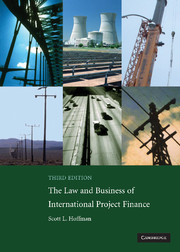 The Law and Business of International Project Finance
The Law and Business of International Project Finance Book contents
- Frontmatter
- Contents
- Preface to the Third Edition
- Preface to the Second Edition
- Preface to the First Edition
- PART ONE AN INTRODUCTION TO PROJECT FINANCE
- PART TWO RISK IDENTIFICATION, ALLOCATION, AND MITIGATION
- PART THREE PROJECT FINANCE STRUCTURES
- PART FOUR TECHNICAL, POLITICAL, AND ECONOMIC FEASIBILITY
- PART FIVE PROJECT FINANCE DOCUMENTATION
- CHAPTER TWELVE AN OVERVIEW OF PROJECT DOCUMENTATION
- CHAPTER THIRTEEN REPRESENTATIONS AND WARRANTIES IN PROJECT FINANCE CREDIT AGREEMENTS AND CONTRACTS
- CHAPTER FOURTEEN PRELIMINARY HOST-COUNTRY AGREEMENTS
- CHAPTER FIFTEEN CONSTRUCTION CONTRACTS
- CHAPTER SIXTEEN INPUT CONTRACTS
- CHAPTER SEVENTEEN OPERATION AND MAINTENANCE AGREEMENTS
- CHAPTER EIGHTEEN PROJECT FINANCE OFF-TAKE SALES CONTRACTS
- CHAPTER NINETEEN POWER SALES AGREEMENTS
- PART SIX CREDIT ENHANCEMENT
- PART SEVEN DEBT AND EQUITY FINANCING
- PART EIGHT COLLATERAL
- PART NINE PROJECT SPONSOR AND INVESTOR AGREEMENTS
- PART TEN SPECIAL TOPICS IN PROJECT FINANCE
- Appendix A A Checklist of Due Diligence Considerations for a Project Financing
- Appendix B UNCITRAL Legislative Guide on Privately Financed Infrastructure Projects
- Project Finance Terms, Abbreviations, and Acronyms
- Select Bibliography
- Index
CHAPTER TWELVE - AN OVERVIEW OF PROJECT DOCUMENTATION
from PART FIVE - PROJECT FINANCE DOCUMENTATION
Published online by Cambridge University Press: 05 June 2012
- Frontmatter
- Contents
- Preface to the Third Edition
- Preface to the Second Edition
- Preface to the First Edition
- PART ONE AN INTRODUCTION TO PROJECT FINANCE
- PART TWO RISK IDENTIFICATION, ALLOCATION, AND MITIGATION
- PART THREE PROJECT FINANCE STRUCTURES
- PART FOUR TECHNICAL, POLITICAL, AND ECONOMIC FEASIBILITY
- PART FIVE PROJECT FINANCE DOCUMENTATION
- CHAPTER TWELVE AN OVERVIEW OF PROJECT DOCUMENTATION
- CHAPTER THIRTEEN REPRESENTATIONS AND WARRANTIES IN PROJECT FINANCE CREDIT AGREEMENTS AND CONTRACTS
- CHAPTER FOURTEEN PRELIMINARY HOST-COUNTRY AGREEMENTS
- CHAPTER FIFTEEN CONSTRUCTION CONTRACTS
- CHAPTER SIXTEEN INPUT CONTRACTS
- CHAPTER SEVENTEEN OPERATION AND MAINTENANCE AGREEMENTS
- CHAPTER EIGHTEEN PROJECT FINANCE OFF-TAKE SALES CONTRACTS
- CHAPTER NINETEEN POWER SALES AGREEMENTS
- PART SIX CREDIT ENHANCEMENT
- PART SEVEN DEBT AND EQUITY FINANCING
- PART EIGHT COLLATERAL
- PART NINE PROJECT SPONSOR AND INVESTOR AGREEMENTS
- PART TEN SPECIAL TOPICS IN PROJECT FINANCE
- Appendix A A Checklist of Due Diligence Considerations for a Project Financing
- Appendix B UNCITRAL Legislative Guide on Privately Financed Infrastructure Projects
- Project Finance Terms, Abbreviations, and Acronyms
- Select Bibliography
- Index
Summary
GENERALLY
Contracts are king in project finance. Perhaps no commercial contracts are more discussed and analyzed in the financing context than those used in project finance transactions. Because nonrecourse and limited recourse project finance are based on the predictability provided by the contract structure, project sponsors and lenders are all interested in the risk allocation and other contract terms.
It is not an overstatement to write that every term of a project finance document is significant for the project participants. Examples of important project finance provisions are
restrictions on the use or sale of any project asset;
restrictions on the right to receive or use project cash flows;
grants of security interests or similar collateral security rights to any party other than the project lender;
short cure periods for defaults or restrictions on automatic terminations without any cure periods;
force majeure provisions; and
transferability of project documents following a foreclosure.
The following chapters in this part of the book contain summaries of the significant documents in a project financing. Although the documents might seem to be a bit overdone, do not be too confused or disheartened. One author commented:
While the attainment of … [project finance] objectives leads to flights of legal ingenuity which one might think could be put to better purpose, it nevertheless explains the background which applies in certain cases to some of the idiosyncratic contracts [used in a project financing]….
Information
- Type
- Chapter
- Information
- The Law and Business of International Project FinanceA Resource for Governments, Sponsors, Lawyers, and Project Participants, pp. 113 - 120Publisher: Cambridge University PressPrint publication year: 2007